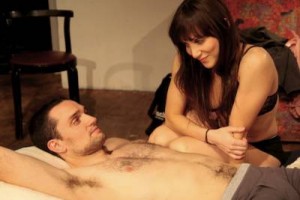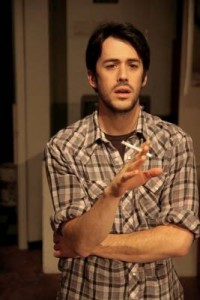
New York cinephiles Johnny and Arden are 20something “friends with benefits,” or at least that’s how Johnny would refer to his “recreation” with Arden. She, on the other hand, considers their four-and-a-half years’ worth of occasional sex + conversations about movies a “relationship.” Imagine her dismay upon learning that Johnny plans to move to Los Angeles, that he’s already started packing, and that worst of all, it’s because he met a girl three weeks ago and the move out west is to be with her. Then there’s Johnny’s roommate of five years, Plato, who despite dating girls seems even more in love with Johnny than Arden is…and far more distraught about Johnny’s impending departure. Add to the mix the arrival of Johnny’s new girlfriend Natalie, and you’ve got Cinephilia, 80 absorbing minutes of clever conversation and twisted relationships.
Cinephilia begins with a boxer-briefed Johnny lying in bed center stage, Arden seated on the sofa in bra and panties. After a bit of post-coital conversation, she asks him, “What’s your take on Cassavetes?” to which he replies “I think I’m gonna move back to L.A.” Somehow this leads to a discussion of the relative merits of Goddard vs. Tarantino. (The former steals; the latter “steals from crap in order to make more crap.”) Things quickly get serious when Arden learns about Johnny’s new love Natalie, whom he met (where else?) “at a screening of a couple of Alain Delon films.” Later, after Natalie has arrived, there’s an especially interesting moment when Natalie realizes (and feels betrayed about the fact) that Johnny and Arden have just now been quoting from Say Anything, and that she’s been totally left out of the equation.
Graham Sibley and Amy Rosoff are very good as the two friends with benefits. Both are natural (and attractive) young actors, with an easy rapport, smoothly transitioning from banter to baiting to flirting and back again. Louise Munson perfectly captures “good girl” Natalie, especially upon discovering the two-timer her perfect new boyfriend really is, and Rosoff is particularly good when she deliberately sets about making sure that Natalie realizes this.
Best of the bunch is lanky dark-haired Wes Whitehead as Plato, who electrifies the stage from the moment he enters spouting his first lines in a Scottish brogue. Plato is a waiter i.e. struggling actor, who arrives bemoaning the fact that he “changed tables tonight and lost the chance to wait on John C. Reilly.” Plato has recently broken up with his girlfriend Olivia, and now wants to take the energy he focused on her for two years and put it into his acting, in order to be another James Dean.
And speaking of James Dean, there is the (intentional?) similarity in both name and the (possibly) repressed same-sex longings shared by Rebel Without a Cause’s Plato and Cinephilia’s best friend of the same name. Arden wonders, “Do you two ever just sit around jerking each other off while watching Midnight Cowboy?” Hard not to wonder, when Plato asks Johnny without a trace of irony, “Are you just gonna break up with me. We’ve been living together for five years. You’ve known that girl for three weeks?”
The more you know about movies and the more you can quote from them, the more you will appreciate Leslye Headland’s writing, something I realized when Johnny and Arden started quoting Say Anything, one of the handful of movies I know backwards and forwards. But even if you’re just the average filmgoer, you’ll enjoy the way everything in life reminds the two cinephiles of a movie.
–Arden, you and I are not a couple. Have you seen the movie Audition?
–We can all be your harem, like Felini’s 8½.
–Quoting Se7en won’t make any of this disappear.
Cinephilia is most definitely a fly-on-the-wall play (one of my favorite genres), where you suddenly realize that you’ve forgotten that this is a play and feel almost that you’ve been looking through a peephole at real people having real conversations. The set design, by Sarah Utterback, helps in this illusion. Utterback (who also has the daunting challenge of understudying both Arden and Natalie) has designed a nicely grungy apartment, movie posters on the wall, a double bed mattress and box spring on the floor. (Both are quickly hidden in an
alcove before Natalie arrives.)
Leslye Headland playwright (who also directed Cinephilia with an “actors’ director” sensitivity) is clearly one to watch. (Cinephilia is the first in a projected seven Headland plays about the Deadly Sins scheduled for the next year and a half.) If there’s any flaw in this particular play, it’s that a script based around cinema references does come across a touch gimmicky, and that (as is often the case in this type of conversation-as-theater play), the ending is a tad unsatisfying. Where, after all, do you end a play, when the conversation will most certainly continue post blackout?
Despite these minor gripes, Cinephilia proves to be a satisfying and well-written drama (with laughs) which offers four talented up-and-coming actors the chance to show their stuff.
Working Stage Theatre, 1516 N. Gardner Street, West Hollywood.
http://iamatheatre.com/
–Steven Stanley
December 2, 2007




 Since 2007, Steven Stanley's StageSceneLA.com has spotlighted the best in Southern California theater via reviews, interviews, and its annual StageSceneLA Scenies.
Since 2007, Steven Stanley's StageSceneLA.com has spotlighted the best in Southern California theater via reviews, interviews, and its annual StageSceneLA Scenies.







 COPYRIGHT 2024 STEVEN STANLEY :: DESIGN BY
COPYRIGHT 2024 STEVEN STANLEY :: DESIGN BY